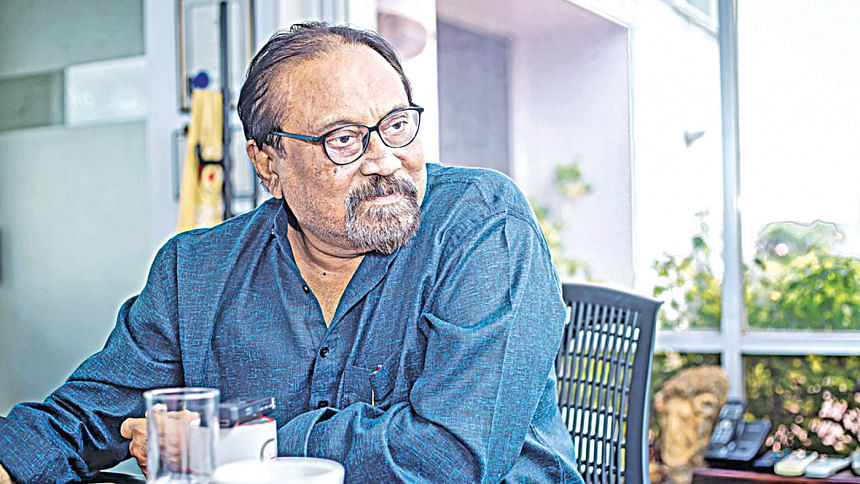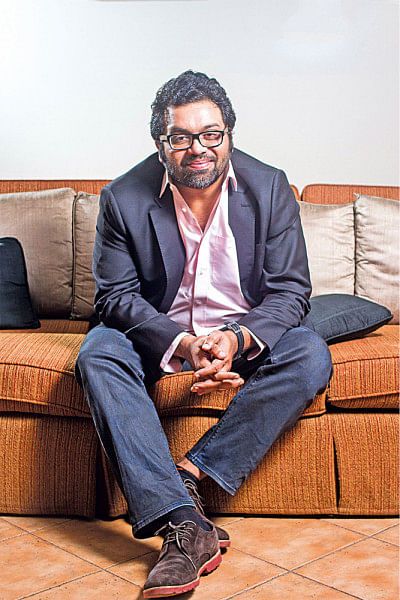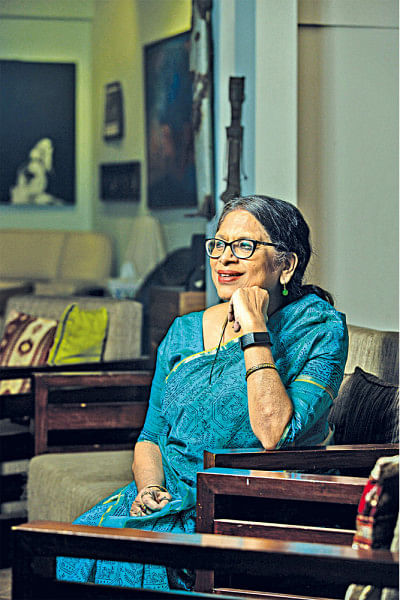ON MOMENTS AND MEMORIES

Rafi Hossain: Today, we have two very special guests, Sarah Zaker and Iresh Zaker. Since the passing of Aly Zaker last year, it has been a very sad time for the industry. I must ask you Iresh, how are you handling it, and how are you coping with the fact that Aly Zaker is no more?
Iresh Zaker: My father's death affected us all, and no matter how well we do cope, there are times when it's difficult to deal with things without him by our sides. I'm somewhat of a private person, so I rarely post things about how much I miss him on social media. I think that different people grieve in different ways. My father would always be there for us even if we never told him, and without him here, there are days when I feel lost and alone. But, I must add that even though he is not here, my mother is here and she is always looking out for her children, and I am really grateful for that.
Rafi: Iresh, now that you are a father, do you understand your father better?
Iresh: Definitely. After becoming a father myself, I started to see both my mother and father in a different light. But, when we lost my father, I started seeing him in another way. We knew for the last year of his life that he did not have too long left. He suffered from terminal cancer, and we knew he was not coming back from it. In that time, I started to see him in a way that really shaped the relationship that I have with my child. And when the COVID-19 pandemic started, I spent a lot of time together with my daughter and my father. We formed a very special bond during that time.

Rafi: Sarah bhabi, you got to see such an enigmatic personality from up close. You were there with him through all the successes and hardships. Now that he is gone, have you found yourself rediscovering him as a person, and how has it been for you without him?
Sarah Zaker: After my husband passed away, I subconsciously kept on doing some things which I used to do when he was with us. He was always very fond of pens, and would always keep a lot of pens with him. He used ink pens which would dry if not cleaned and refilled. So, when he passed away, I continued to have someone clean and refill those pens like we did when he was alive. I think that if I keep things the way we did when he was alive, then in a way it is like he is still with us. I also made sure that we kept his pill box filled and kept beside the bed even after he was gone.
Iresh: Then my daughter actually ate some pills from that box.
Sarah: That was a very horrible experience for me. One day, when I was checking the pill box, I saw that it was opened and a pill was missing. I called the person who I had told to organise the box, and he said that he had filled everything. So, when I realised that my granddaughter, Meha, had actually taken the pill, I broke down. My daughter-in-law. Meem, had entrusted me and left Meha with me, and I let her take a medicine from that box. I was so worried to tell her what had happened. It was very hard on me.
Rafi: Aly Zaker was a person I always considered to be larger than life. With that being said, did he have anything that he wanted to do, but unfortunately passed away before he could?
Iresh: When you say larger than life, we always talk about the roles he did in stage plays like Galileo. But, he never got to play those kinds of roles in cinema. Even before he got cancer, he would always say that he wished he got to do something like what Marlon Brando did in Godfather: play a larger-than-life character in a movie.
Sarah: He really wanted to do King Lear, but never got around to doing it. He had this attitude where he always wanted to do more. He never wanted to have a role that was like his swansong. I once accidentally told him that Galileo was his swansong, and he immediately said that he would do more and that it was definitely not his swansong. I think that's why when he neared his end, he was very depressed. He wouldn't tell his children about it, but I could understand it.

Rafi: Iresh, you joined acting relatively late in your life. Were you not that interested in it when you were younger?
Iresh: I was interested, but when I was in school and later in university, I was involved in a lot of extracurricular activities alongside my studies. I used to see how hard my parents had to work to sustain a career in acting, so it did not seem very possible to me at the time. At 18, I went abroad for my studies and even had a job.
Sarah: I helped him out when he started. I must give credit to Ratan Paul for this, as he helped out a lot. Iresh started off by working in television, and to compare his journey to mine would be very different. He enjoyed working on television series, but when I thought of doing a series, I realised that I had to spend a lot of time working on the same series. So, I chose not to do that. I thought that since I am already established on stage plays, I'm happy to stay with that. My sister thinks that since Iresh loved acting so much, he decided to pursue acting in a way where he could establish himself as an actor without people thinking that he made it so far because we are his parents. He pursued acting even when we told him that it might not be a wise career move for him.
Rafi: You both might disagree with me on this, but I think that Sarah bhabi did not do as many roles as she should have throughout her career. Do you sometimes wish that you performed more?
Iresh: Far from disagreeing with you, I completely agree with you on this, Rafi bhai. I think that throughout her career, my mother has been a very underutilised actor. Even now, when she wants to do something, she will probably decide against it because she doesn't want to find the time for it. Another reason I think that she did not have many roles is that the personality my mother has intimidates most male directors in Bangladesh. So, when these directors are intimidated, they feel hesitant to cast her. But, I think that my mother has many great roles ahead of her. We will have to write roles for powerful women in visual media, and I think that she will be perfect for a role like that. I did not do too many roles where I acted alongside her, but in the ones I did, I saw that the directors were too intimidated to direct her. So, I think that if a good director works with her, then she can do some amazing work onscreen.
Sarah: I have been approached to do a few roles, and even though I am not quite ready to do them now, I think that in the near future, I will definitely be interested in doing more good roles. So, if anyone writes a role with me in mind, then I will definitely be interested in doing it.
Rafi: Iresh, both your parents have always been heavily involved with theatre. So, would you consider doing theatre regularly in the future?
Iresh: I did do a theatre performance back in 2019. When I did The Inspector Calls, I think the weight of my parental heritage weighed me down in a way. And since that made me nervous, I think that my acting in that play was not good enough. But, I still have a desire to give good performances in theatre. There was a point where theatre really intimidated me because of what both my parents have achieved there. However, I must add that performing onstage is a very rewarding feeling.
Sarah: The thing is, Iresh is a very good actor when it comes to television. For the close-up mediums, he is a fantastic actor, but for a stage performance, he is not theatrical enough.
Iresh: I agree. My father learnt to be very theatrical onstage, but when playing a much calmer role, he would also execute it perfectly. His acting was very versatile. Intelligent actors can adapt to the role they are playing, and my father always did.
Rafi: Do you have any final message for the readers?
Iresh: I will ask the readers to pray for us, so that both my mother and I can do better roles and give something back to all of you.
Sarah: I want everyone to love our country, and to work for the country. I think that no matter which generation you are in, loving your country should be a constant factor. If we love our country enough, we can help our country move ahead.

 For all latest news, follow The Daily Star's Google News channel.
For all latest news, follow The Daily Star's Google News channel. 



Comments